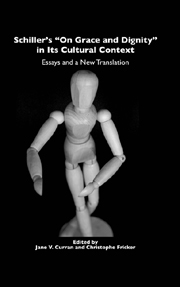Book contents
- Frontmatter
- Contents
- Acknowledgments
- Notes on References and List of Abbreviations
- Introduction
- The Cultural Context
- Schiller's Essay “Über Anmut und Würde” as Rhetorical Philosophy
- Schiller as Citizen of His Time
- Sensuous-Objective: Beauty in the Realm of Human Freedom: On the Language of Concepts in Schiller's Essay “On Grace and Dignity”
- From Romantic Dream to Idyllic Tragedy: Idealism and Realism in Schiller's Dramas, Before and After Kant
- The Poet as Herald of Grace and Dignity: The Influence of Schiller's Twin Concepts on Stefan George
- The Text
- Notes on the Contributors
- Index
Schiller's Essay “Über Anmut und Würde” as Rhetorical Philosophy
from The Cultural Context
Published online by Cambridge University Press: 05 February 2013
- Frontmatter
- Contents
- Acknowledgments
- Notes on References and List of Abbreviations
- Introduction
- The Cultural Context
- Schiller's Essay “Über Anmut und Würde” as Rhetorical Philosophy
- Schiller as Citizen of His Time
- Sensuous-Objective: Beauty in the Realm of Human Freedom: On the Language of Concepts in Schiller's Essay “On Grace and Dignity”
- From Romantic Dream to Idyllic Tragedy: Idealism and Realism in Schiller's Dramas, Before and After Kant
- The Poet as Herald of Grace and Dignity: The Influence of Schiller's Twin Concepts on Stefan George
- The Text
- Notes on the Contributors
- Index
Summary
If their letters are to be considered reliable evidence, relations between Schiller and Kant remained cordial and gentlemanly, despite the fact that Schiller's essay “On Grace and Dignity” was written partly as a corrective to Kant's position in the Critique of Judgment. Schiller's premise, if not his structural point of departure, taken from the formula he had earlier established, already demarcates the margin that separates his views from Kant's moral didacticism: “Schönheit ist … nichts anders als Freiheit in der Erscheinung” (NA 26:183, Beauty is nothing other than freedom in appearance). Liberated from the need to settle aesthetic questions in terms of subjective judgment or taste, Schiller begins his analysis of grace as present in the unconscious movement of a morally conscious (and beautiful) being. In a letter to Kant (13 June 1794; NA 27:12) Schiller describes how he intended to soften the severity of the philosopher's theories and make his views more accessible to the public. Kant's inquiry into a universal standard by which beauty can be judged and recognized is singularly devoid of examples, and nowhere does he try out his principle by applying it to any of the fine arts. In diplomatic mood, Schiller expresses the wish not to be regarded as an opponent of Kant's, and is relieved by Kant's apparent disinclination to see him in this light.
Schiller evidently made a deliberate decision to treat the definitions of beauty and dignity, and the aesthetic questions which arise from them, in a style that not only reflected but actually embodied his subject matter.
- Type
- Chapter
- Information
- Schiller's 'On Grace and Dignity' in its Cultural ContextEssays and a New Translation, pp. 21 - 36Publisher: Boydell & BrewerPrint publication year: 2005

